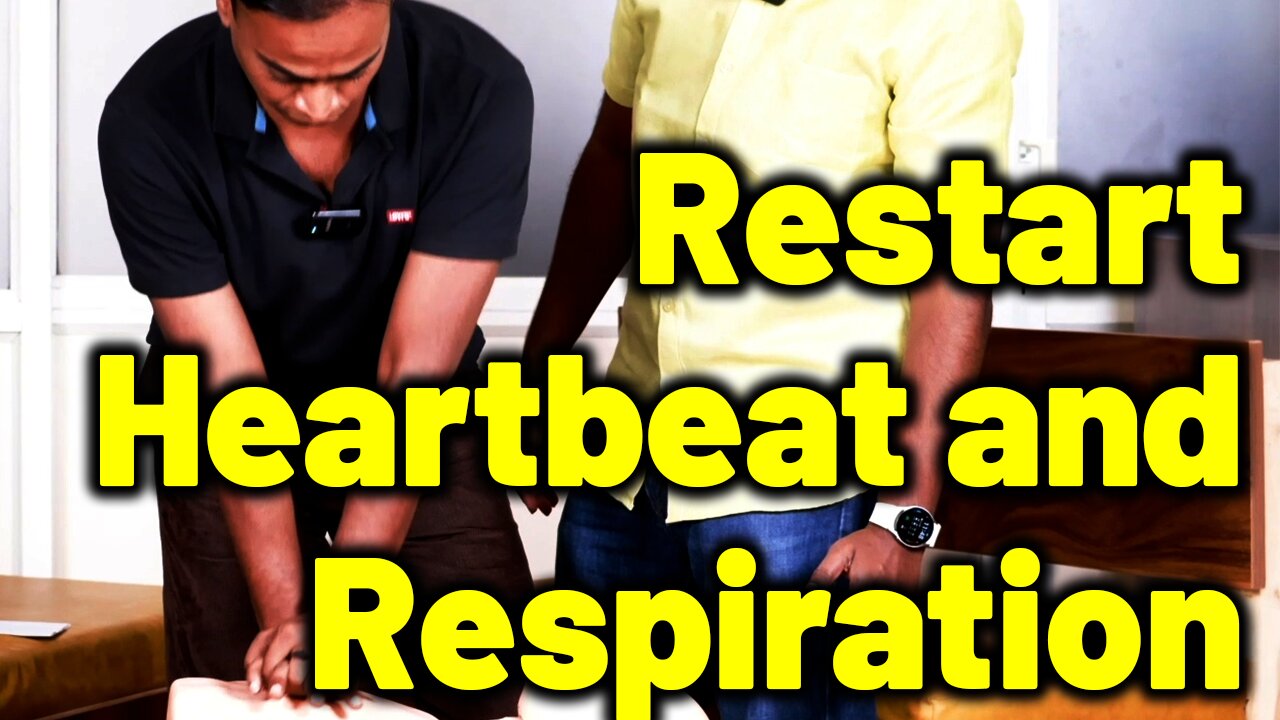Premium Only Content

How to Reactivate Heartbeat and Breath ? | Dr. Bharadwaz | Dr. RanjithKumar
Program
Health Authentic
true health information
Expert | Latest | Honest
About Video :
Cardiopulmonary Resuscitation (CPR) is a life-saving technique used in emergencies when someone's heartbeat or breathing has stopped. It involves chest compressions and rescue breaths to maintain circulation and oxygen flow to vital organs until professional help arrives. Key steps include checking responsiveness, calling emergency services, performing chest compressions at a rate of 100-120 per minute and a depth of 2 inches for adults, and using an Automated External Defibrillator (AED) if available. Immediate CPR can double or triple survival chances.
Questions Addressed :
What are the key steps in performing CPR on an adult?
How does the technique for CPR differ between adults, children, and infants?
When should you perform hands-only CPR instead of traditional CPR with rescue breaths?
How do you check for responsiveness and breathing before starting CPR?
What is the recommended compression depth and rate for effective chest compressions?
How do you use an Automated External Defibrillator (AED) during CPR?
What are the potential risks or complications associated with performing CPR?
About Dr. Bharadwaz :
Health and Fitness Speciality
Medicine, Surgery and Homeopathy Doctor
Clinical Research Subject Matter Expert
Guest Dr. RanjithKumar
Qualification : MBBS, MRCEM
Expertise : Emergency Specialist
#CPR #FirstAid #SaveLives #EmergencyResponse #HeartHealth #LearnCPR #BystanderCPR #CPRAwareness #CPRTraining #CardiacArrest #AED #ChestCompressions #LifeSavingSkills #RescueBreaths #EmergencyPreparedness
#HealthAuthentic
#DrBharadwaz #ClingeniousCompany #Helseform #HelseformFitness #Health #Fitness #Fidicus #FidicusHomeopathy #Homeopathy #Medicine #Surgery #Clingenious #ClingeniousResearch #ClinicalResearch #ClinicalInteractiveSystem
-
 2:04:21
2:04:21
vivafrei
1 day agoEp. 278: D.C. Peace Wave! Big Tish & Nipple Judge SPANKED! "Maryland Man" Trafficker FREE & MORE?
90.7K114 -
 LIVE
LIVE
Damysus Gaming
3 hours agoBorderlands 3 - Part 8 - FL4K Time | Children of the Vault be Warned!
68 watching -
 1:30:28
1:30:28
Patriots With Grit
6 hours agoWhat You Should Know About Harmful Vaccine Ingredients And What To Say To Your Doctor, Pediatrician, Health Department or School When They Pressure You, Your Kids Or Your Family Members | Dr. Bryan Ardis, D.C.
11.7K5 -

This is the Ray Gaming
2 hours ago $0.01 earnedSunday Night Live with the Boys | Rumble Premium Creator
6.38K -
 2:02:16
2:02:16
ItsMossy
3 hours ago🍃NEW MIC WHO THIS🍃DRIVING SIM GO BRRR🍃420 SESH🍃
3.86K1 -
 LIVE
LIVE
THOUGHTCAST With Jeff D.
2 hours agoSunday night Fortnite With ScottishVikingGaming & crew
30 watching -
 3:11:45
3:11:45
a12cat34dog
3 hours agoSOLID DAWG RETURNS :: METAL GEAR SOLID :: 1998 IS UNFORGIVING {18+}
6.94K1 -
 4:02:55
4:02:55
yellow_1ron
5 hours agoGAMING WITH THE HOMIES JOIN UP | JOIN!
7.97K -
 1:52:25
1:52:25
JohnnyDrop
4 hours agoJOHNNY DROP | Let's get to 100 Followers | Warzone / PGA / Question of the Day
6.72K1 -
 11:52
11:52
Exploring With Nug
5 hours ago $0.16 earnedWhat’s Hiding Under This Dallas Lake We Found a Vehicle!
25K3